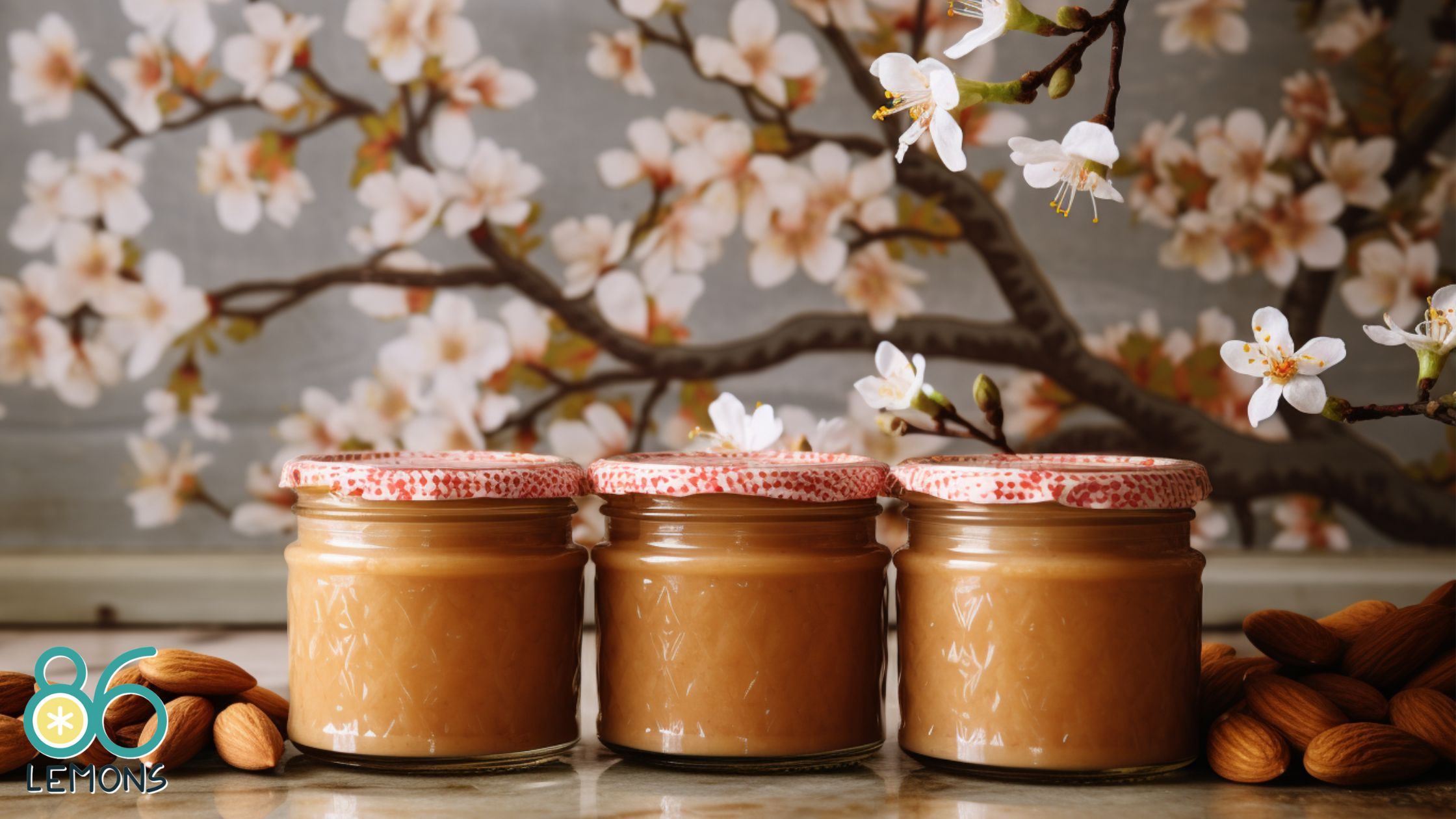Deliciously creamy and versatile, almond butter has gained popularity not only for its rich taste but also for its health benefits. Yet, amidst the buzz around this delectable spread, there’s a looming question among the vegan community: is almond butter vegan?
In this article, we’ll delve into the ingredients, production methods, and ethical considerations to uncover the truth about this beloved nutty delicacy. Let’s check out if you can really pair an almond butter sandwich with your favorite vegan matcha latte!
Is Almond Butter Vegan?

Almond butter is a popular spread that can be both delicious and vegan-friendly. Understanding the composition and defining traits of vegan almond butter is essential for making informed dietary choices.
Defining Vegan Almond Butter
Vegan almond butter is a type of spread made exclusively from plant-based ingredients, ensuring the absence of animal-derived products. Typically, pure almond butter should consist of almonds, which are naturally vegan.
Common Ingredients in Vegan Almond Butter
The primary ingredient in vegan almond butter is almonds. To enhance flavor or texture, additional ingredients such as salt may be included. You should look for labels that list only plant-derived components to ensure the almond butter fits within vegan guidelines.
Health Benefits of Almond Butter

Almond butter is a nutritional powerhouse that provides essential nutrients beneficial for your overall health. It’s packed with healthy fats, proteins, and various vitamins and minerals that positively impact various aspects of your health.
Nutritional Profile
Almond butter is rich in protein and fiber, both of which are crucial for maintaining a healthy diet. A typical serving contains approximately 3.4 grams of fiber and 6.7 grams of protein. It also provides a good source of calcium and magnesium, both necessary for bone health. Furthermore, almond butter is a great source of vitamin E, an important antioxidant, and contains essential minerals such as potassium.
Heart Health Implications
Incorporating almond butter into your diet can be beneficial for heart health. The high levels of monounsaturated fats are known to help lower LDL (the “bad”) cholesterol and increase HDL (the “good”) cholesterol. Regular consumption may be linked to a reduced risk of heart disease.
Benefits for Vegans
For vegans, almond butter is a healthy choice as it delivers healthy fats while also being naturally dairy-free and vegan-friendly. It’s an excellent way to supplement your diet with additional protein and essential nutrients, which might be more challenging to obtain from a plant-based diet alone.
Making Almond Butter at Home
Creating almond butter in your own kitchen is a straightforward process that provides you with a fresh, natural, and customizable spread. You’ll need only a few key tools and ingredients, but the result is a creamy and delicious almond butter made to your taste.
Basic Almond Butter Recipe
Ingredients:
- 2 cups of raw almonds or roasted almonds
Equipment:
- 1 food processor or high-speed blender
Instructions:
- Prep Time: 10 minutes (if roasting almonds)
- Cook Time: 10-12 minutes
- Total Time: 20-22 minutes, plus additional time for blending
- If using raw almonds, roast them in a 350°F oven for 10 minutes to enhance their flavor. Stir them halfway through the roasting time.
- Allow the almonds to cool slightly, then transfer them to your food processor or blender.
- Blend on high until the almonds go from coarsely ground to smooth and creamy, stopping to scrape down the sides as needed. This could take up to 15 minutes.
You can tailor your almond butter precisely to your preference (see variation tips below!). Soon enough, you’ll be creating the blend that’s perfect to pair with some homemade vegan bread!
Almond Butter Varieties and Comparisons
When exploring the world of almond butter, you’ll come across a diverse spectrum ranging from store-bought to homemade and have many options to compare with other nut butter. Each variety presents its own flavor profile and nutritional benefits.
Industrial vs Homemade
Industrial almond butter is widely available in brands like 365 Everyday Value Almond Butter and Kirkland Signature Almond Butter. These products often contain additional ingredients, such as palm oil, salt, and sometimes sweeteners, to enhance shelf stability and flavor.
On the other side, homemade almond butter gives you control over the ingredients. You can start with natural almonds or roasted nuts, and the process is simple – just blend until creamy, potentially adding a pinch of salt or a drizzle of neutral oil for consistency, as suggested by The Vegan Atlas.
Almond Butter vs Other Nut Butters
Comparing almond butter to other nut butters, each variety offers distinct advantages. Peanut butter is commonly praised for its protein content, while cashew butter tends to be creamier with a sweeter taste.
Coconut butter includes fiber and medium-chain triglycerides, and sunflower seed butter stands out as an allergy-friendly alternative with a high vitamin E content.
However, if you prefer a spread made solely from seeds, seed butter options are available. Spread The Love Almond Butter, for instance, focuses on simplicity with minimal ingredients, usually just almonds and salt, catering to those looking for a pure, vegan-friendly option.
Nutritional Enhancements and Flavorings

When personalizing your almond butter, you have the option to boost its nutritional value and taste. Just as with following vegan cookbooks, incorporating certain add-ins can enrich both the flavor profile and health benefits of any homemade food.
Healthy Add-ins for Almond Butter
Cinnamon: Adding a dash of cinnamon not only imparts a warm, spicy flavor but also brings potential blood sugar regulation benefits to your almond butter.
Ginger: Incorporate a hint of ground ginger for a zesty twist that also offers digestive and anti-inflammatory properties.
Maple Syrup: A drizzle of maple syrup can naturally sweeten almond butter while providing antioxidants and nutrients like manganese and zinc.
Sweeteners: If you prefer a sweeter almond butter without added sugar, consider using plant-based sweeteners like stevia or monk fruit extract to maintain the vegan quality while satisfying your sweet tooth.
Dietary Considerations and Almond Butter

When considering almond butter for your diet, it’s key to understand how it fits within various dietary frameworks, particularly if you follow a vegan or paleo diet.
Almond Butter in Special Diets
Vegan Diet: Almond butter is a staple in the vegan diet as it is inherently plant-based, making it an ideal source of healthy fats and protein. However, you should examine labels for additives like honey or palm oil, which some vegans may choose to avoid due to environmental or ethical concerns.
Paleo Diet: If you’re adhering to a paleo diet, almond butter can be a compatible choice, provided it does not contain prohibited substances like added sugars or artificial preservatives. Pure almond butter, consisting solely of ground almonds, fits within the paleo diet parameters.
Storing Almond Butter

To maintain the quality and shelf life of your almond butter, proper storage is key. Here’s how to keep it at its freshest.
Best Practices for Freshness
- Location: Store your almond butter in a cool, dry place away from direct sunlight. A pantry or cupboard is ideal. If you’ve opened the jar, refrigeration can help to preserve its freshness for a longer period.
- Container: Use an airtight container, such as a glass jar, to prevent moisture and contaminants. If you purchased almond butter in a plastic jar, keeping it in its original container is fine as long as it seals well.
- Freezing: You can freeze almond butter to extend its shelf life. Transfer it to a freezer-safe container or tightly seal the original jar. When you’re ready to use it, thaw it overnight in the refrigerator and stir before using since separation may occur.
Environmental and Ethical Aspects
When you choose almond butter, you’re not just selecting a spread for your toast but also impacting the environment and communities involved in its production. Environmental and ethical considerations are at the forefront of understanding almond butter’s role in a sustainable lifestyle.
Sourcing of Ingredients
Almonds: The cornerstone ingredient, almonds, are deeply scrutinized for their water usage. It’s critical to assess whether almond farms employ sustainable water practices, given the concerns surrounding droughts and scarcity in almond-growing regions.
Palm Oil: Some almond butter brands include palm oil to improve spreadability. However, the production of palm oil has been linked to deforestation and habitat destruction. Your choice might lean towards almond butter varieties sans palm oil for a more environmentally friendly option.
Sustainable almond butter comes down to how it’s made and the story behind each jar. By emphasizing ethically sourced ingredients, you can be an informed consumer who supports a healthier planet with every purchase.
Practical Uses of Almond Butter
Almond butter is a versatile and vegan-friendly ingredient that can enhance the flavors of various meals throughout the day. It serves as a nutritious alternative to traditional spreads and can add depth to breakfast, snacks, and desserts.
Incorporating Almond Butter Into Meals
For Breakfast:
- Toast: Spread almond butter on whole-grain toast for a quick and filling start to your day.
- Smoothies: Blend a tablespoon of almond butter into your morning smoothie for added creaminess and protein.
- Oatmeal: Swirl almond butter into hot oatmeal for a rich, nutty flavor.
As a Snack:
- Apple Slices: Dip crisp apple slices into almond butter for a healthy and satisfying snack.
- Celery Sticks: Fill celery sticks with almond butter; sprinkle with raisins for a fun and crunchy treat.
- Energy Bites: Combine almond butter with oats, honey, and flax seeds to make energy bites — a portable and energizing snack.
For Desserts:
- Cookies: Use almond butter as a base for delicious vegan cookies; it adds moisture and richness.
- Brownies: Incorporate almond butter into vegan brownie recipes for a fudgy texture.
- Ice Cream Topping: Drizzle almond butter over dairy-free ice cream for a decadent dessert topping.
In each use, almond butter not only infuses your meals with flavor but also provides a wealth of nutrients, including healthy fats and protein, making it a smart choice for any vegan diet.
Interested in other guilt-free bites? Check out our list of the best vegan snacks on Amazon!
Product Recommendations and Reviews

In this section, you’ll find some of the top recommended almond butter brands to guide you in making an informed purchase.
Top Almond Butter Brands
- 365 Everyday Value Almond Butter: A wallet-friendly choice, this almond butter is a go-to option for those who enjoy quality without a high price tag. It’s sold at Whole Foods and provides a smooth, consistent spread perfect for everyday use.
- Kirkland Signature Almond Butter: Available at Costco, this brand is known for its pure ingredients and lacks unnecessary additives, making it a wholesome choice for your pantry.
- Spread The Love Almond Butter: An artisanal option, this almond butter is non-GMO and made with a focus on simplicity and natural flavors. It’s a delightful pick if you’re willing to invest a bit more for a premium spread.
Selecting the right almond butter can come down to personal preference regarding taste and texture, but also factors like price and ingredient quality. No matter your choice, these brands offer a vegan-friendly option to complement your diet.
READ NEXT: Is Movie Theater Popcorn Vegan? Unpopped Truths Revealed


